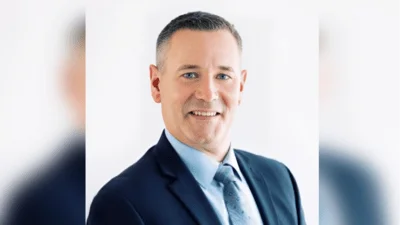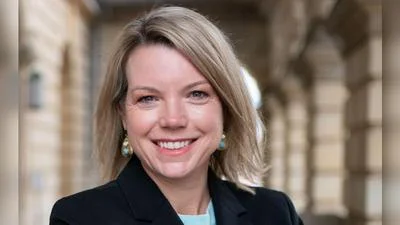Belleville Memorial Hospital issued the following announcement on Mar 18.
This past December, COVID-19 hit Penny Bopp quickly.
Bopp, an emergency room assistant nurse manager at Memorial Hospital Belleville, was doing housework when she started to feel unusually cold. From one moment to the next, she went from feeling fine to having violent chills and a 103-degree fever. “It was crazy how fast it hit me,” says Bopp.
Bopp has a history of asthma and was having shortness of breath but said it was different from what she was used to feeling.
“I had aches and chills like I had never had before — they hurt all the way to the bone,” says Bopp.
“The next day my breathing got worse and Tylenol wasn’t helping my fever. I also lost my taste and smell, so I called the BJC COVID-19 Occupational Health number, got tested and it came back positive, which was no surprise to me.
“From working in the ER, I knew Memorial Hospital offered a new COVID-19 treatment called monoclonal antibody therapy (mAb) to help with the symptoms, so I called my primary care physician and asked her if she was aware of the treatment and whether I would qualify,”Bopp says. “I’m thankful she was so responsive in ordering the therapy.”
What is monoclonal antibody therapy?
In November, the U.S. Food and Drug Administration (FDA) issued emergency use authorization for monoclonal antibody treatment of COVID-19 in high-risk patients in certain situations.
According to the FDA, monoclonal antibodies are laboratory-made proteins that mimic the immune system’s ability to fight off harmful pathogens such as viruses — in this case, the virus that causes COVID-19. In a clinical trial of patients with COVID-19 at high risk for disease progression, a single intravenous infusion of monoclonal antibodies significantly reduced COVID-19-related hospitalization and death during 29 days of follow-up, compared to placebo.
Monoclonal antibody treatment for COVID-19 is different from a COVID-19 vaccine. A vaccine triggers the body’s natural immune response, but can take weeks to develop enough antibodies and prevent some kinds of infection. For those who already have the virus, monoclonal antibody treatment gives the body the antibodies it needs to protect itself.
“The therapy is primarily for high-risk patients with a greater likelihood of needing to be hospitalized due to the virus,” says Ryan Birk, PharmD, MS, BCPS, director of pharmacy at Memorial Hospital. “The benefit is to keep patients out of the hospital.”
Birk says, in addition to being at high risk for serious COVID-19 disease, patients must meet additional criteria to benefit from the monoclonal antibody therapy, including a laboratory-confirmed positive COVID-19 test, the ability to receive treatment within 10 days of symptom onset, and the presence of one or more symptoms consistent with COVID-19.
“Everything went smoothly, once the order was placed,” says Bopp. “The staff walk you through the process over the phone, tell you what to expect and even tell you where to park at the hospital. Once you arrive for your appointment, you register while you’re in the car.”
Monoclonal antibody therapy is given intravenously for at least one hour, followed by a one-hour observation period. Including registration and preparation, it takes about three hours at the infusion center. Just one dose is required for treatment.
“What we have seen with patients who receive mAb,” says Birk, “is that the sooner they receive the infusion, the more their symptoms seem to improve.”
‘Feeling better and better’
“The next day I started to feel a little better, and each day after I kept feeling better and better,” says Bopp. “I believe, without a shadow of a doubt, I would have been in the hospital if I did not receive this therapy.
“I was fortunate to be able to advocate for myself,” she adds. “Thankfully, my primary care physician was open to try what was available. The therapy was a life saver for me.”
Monoclonal antibody therapy has been used to treat more than 650 patients in St. Louis and Illinois, says Birk, and is offered at four BJC locations, including Memorial Hospital Belleville, Missouri Baptist Medical Center’s Outpatient Center in Sunset Hills, Barnes-Jewish Hospital and Christian Hospital.
“BJC is bringing in innovative therapies from across the country to our communities, and we are happy to offer this therapy on both sides of the river,” Birk says.
Visit https://www.bjc.org/Coronavirus/mAb-for-COVID-1 for more information.
Original source can be found here.

Source: Belleville Memorial Hospital






 Alerts Sign-up
Alerts Sign-up